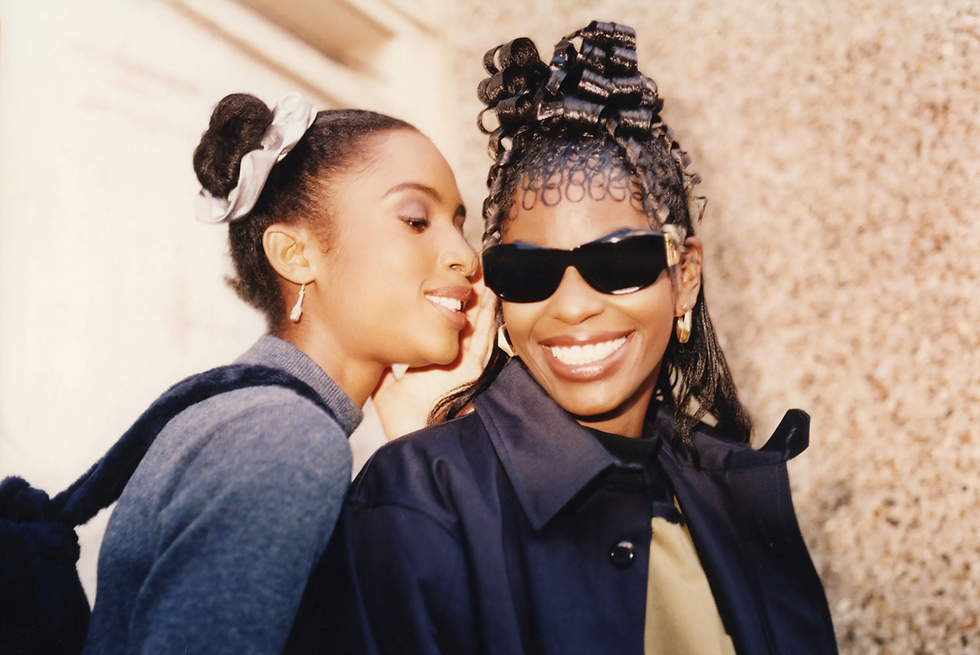What does the Little Simz Tate Late tell us about access to third spaces in London?
- Yellowzine

- Sep 5, 2024
- 4 min read
Updated: Sep 6, 2024
Establishing and maintaining third spaces is a dying art. And London’s worst kept secret is that it doesn’t have many of them. Despite online discourse about the state of the London creative scene, the latest event to put this into perspective was the highly successful Little Simz take over at the Tate.

When Little Simz broadcasted the sold out take over at the Tate Modern on her IG story 10 minutes after the tickets were made available online, I - like many other art lovers - let out a sigh of disappointment. The abuse I inflicted on my chrome browser’s refresh page button was no match for the unresponsive event webpage.
What’s worse is that unbeknownst to me (and the majority of others who tried their luck for tickets to the workshop and panels), the Gorilla rapper and curator, had posted a separate link on her socials; leaving me feeling disgruntled at the glaring fact that I in fact did not have my finger on the pulse of all things art and culture in London. Missing out on the gems dropped at panels and in workshops from other multifaceted babes left me feeling salty. But it also got me thinking about the wider conversation around access to art, knowledge sharing, and third spaces in the city.
The Tate Modern is a distinct architectural labyrinth of art and culture loved by many today. But it has garnered just as much celebration as it has generated criticism. The adaptive reuse of what was previously the bankside power station has become a mecca for art, culture, and free events. Whether you love it, hate it or have complex feelings about the building and its benefactor Henry Tate (who was a sugar magnate), you can’t deny the extent of its impact.

The collab between Simz and the renowned art institution implicitly marks the continuous efforts on behalf of the Tate to diversify its programming. “The adoption of the collapsing buildings of our industrial forefathers” to house art instead of industry draws a parallel with the movement to decolonize and diversify historically white institutions and creative spaces that the Simz’s take over represents. It demonstrates how buildings and institutions that were once fit for purpose are required to adapt and evolve as Britain does too. But in acknowledging the appetite for change, inclusion and visibility of alternate and unconventional viewpoints platformed by art institutions, it has called into question why events with cultural impact like this are so few and far between. Are we - the London creatives and alternative art enthusiasts - being stifled and starved by the lack of inclusive and culturally relevant events that feed creativity and nourish communities?
“Overstimulating”, “insane queues” and “claustrophobic” were a few choice words left in the comment section of a video recounting my experience of the event. It’s undeniable that the Tate staff were caught off guard by the sheer number of attendees who showed up and showed out. Someone else commented “God forbid I want to do something free and wholesome with my friends on a spontaneous Saturday night. Jesus!” This one struck a chord because access to free events in London are so unusual and it really got me thinking about why that is.
Even though this event was free, it was still ticketed, shattering the idea that you can just pull up somewhere and be immersed in a creative, artistic or sonic experience. Despite understanding the practical and logistic necessity for tickets (no shade to the Tate staff, you did amazing sweetie), this reinforced the idea that there’s little room for spontaneity in a city that thrives on hustle culture, routine, and a shared group calendar. How are we supposed to build communities in conditions that actively prevent and oppose the environments in which they thrive? And why are we so reliant on events organised by institutions (that are thrive from exclusionary employment practices) when we have the ideas and desire to organise them ourselves?
It’s no secret that third spaces in London have dissipated over the last few years. Lack of government funding under 14 years of Tory rule has meant that there’s a limited number of events and cultural institutions that can host events like this for free, if at all. This supply and demand issue has left the community of London creatives in a position where most notable events are oversubscribed and overhyped, while others remain exclusive, inaccessible or reliant on the off chance you’re invited to it directly or as a plus one - usually dependent on your social media presence or aesthetic. But third spaces are crucial for the evolution and development of music, dance and art. Literary and musical legacies from the Harlem Renaissance were born from third spaces. Lovers rock was born from third spaces. So in an era that is being defined by the rejection of online relationships and embrace of irl connections, why are we still struggling to recognise their importance?
If you felt like you dodged a bullet after deciding not to go, were just as shocked as I was at the crowds (everyone who ran in I’m looking at you), or if you were undeniably god’s favourite and managed to get those elusive panel tickets; one thing for certain is that we need more events like this. A huge congrats to Little Simz for showing power of collaborations between cultural institutions and public figures to ensure that art institutions stay relevant, cater to the interests of diverse audiences, reflect our experiences, and recognise cultural zeitgeist. Words by Dominique Gabrielle






Comments